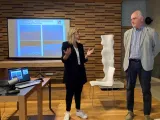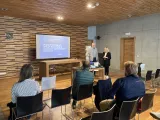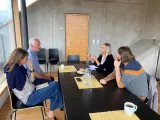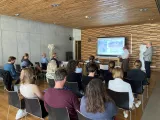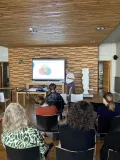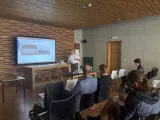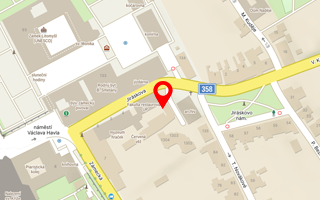Published: 26.09.2024
The Faculty of Restoration at the University of Pardubice joined the European Week for Sustainable Development for the first time this year by organizing two major international lectures focused on innovative approaches to sustainable care of tangible cultural heritage.
The first of these lectures took place on 18 September 2024 and the keynote speaker, Prof. Gerald Ziegenbalg (IBZ-Salzchemie GmbH & Co. KG) presented the topic "Green Conservation - Current Status and Further Research Needs". Prof. Ziegenbalg is an expert in the synthesis of nanomaterials and their use for the conservation of cultural heritage. His current focus is on the development and production of new nanomaterials that minimize the release of toxic substances during restoration, are environmentally friendly and reduce the so-called ecological footprint. In his lecture, he presented the principles and aspects of so-called "green restoration", including specific case studies where the new materials have been successfully used. He described the use of specific materials in the occurrence of specific problems on heritage buildings.
The second invited lecture entitled "Merging Microbiology and Heritage: Biotechnological Innovations in Stone Monuments Conservation" took place on 24 September 2024. Dr. Federica Villa from the Università degli Studi di Milano presented innovative biotechnological approaches in the field of stone monument conservation. The presentation included research results on the interaction of biofilms produced by bacteria with geomaterials and the possibilities of protecting materials based on non-toxic biotechnologies. Another topic of the lecture was the use of specific microorganisms to remove dirt from stone surfaces or murals. The presentation also included a presentation of the principles of bioconsolidation using so-called calcinogenic bacteria, including the results of ongoing research.
Both lectures were given in a hybrid format, which allowed the participation of interested parties from a number of European and non-European countries such as Switzerland, Spain, Estonia Hungary, Algeria or Iraq. The lectures addressed both the academic community as well as practising restorers and experts from research institutions, thus fulfilling the aim of disseminating up-to-date knowledge on sustainable conservation methods at an international level.
